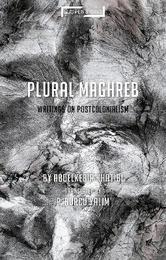
|
Plural Maghreb: Writings on Postcolonialism
Paperback / softback
Main Details
Description
Abdelkebir Khatibi (1938-2009) was among the most renowned North African literary critics and authors of the past century whose unique treatments of subjects as vast as orientalism, otherness, coloniality, aesthetics, linguistics, sexuality, and the nature of contemporary critique have inspired major figures in postcolonial theory, deconstruction, and beyond. At once a philosophical visionary and provocative writer, Khatibi's impressive contributions have been well-established throughout French and continental literary circles for several decades. As such, this English translation of one of his masterworks, Maghreb Pluriel (1983), marks a pivotal turn in the opportunity to wrest some of Khatibi's most profound meditations to the forefront of a more global audience. Including such highly significant pieces as "Other-Thought," "Double Critique," "Bilingualism and Literature," and "Disoriented Orientalism," the ambition behind this volume is to showcase the true experimental complexity and conceptual depth of Khatibi's thinking. Engaging the cultural-intellectual urgencies of a colonial frontier (in this case, the so-called Middle East/North Africa) this book expands our contemplative boundaries to render a globally-dynamic commentary that traverses the East-West divide.
Author Biography
Abdelkebir Khatibi (1938-2009) is considered one of the most prominent writers of postcolonial Francophone literature from North Africa. During his lifetime he won literary and intellectual prizes in Morocco and France. After earning his PhD in sociology at the Sorbonne, he returned to live and work in Morocco. He is the author of Class Warrior (2017), Tatooed Memory (2016), Love in Two Languages (1990) and The Splendour of Islamic Calligraphy (2008). His writings challenge the social and political norms upon which the countries of the Maghreb region were constructed.
ReviewsKhatibi's active and multidimensional thought remains an invaluable addition to the field of North African studies and a relevant resource for understanding the cultural and political challenges in the region and beyond. * Los Angeles Review of Books * Long overdue in English translation, Plural Maghreb is a masterpiece that speaks to and beyond fields and disciplines, whether philosophy or philology, anthropology or commentary, literature or aesthetics. Abdelkebir Khatibi was a brilliant polymath, a superb reader of painting and poetry, of sculpture and calligraphy, and a powerful critic of Orientalism. Expertly translated by P. Burcu Yalim, Khatibi demonstrates the irreplaceable value of erudition and the necessity of uncompromising reflection. Concepts and collectives, texts and contexts, ideas and institutions, prose and poetry - it is hard to think of a book that braces in such a rich way the exigencies of each, and the political commitment that decolonization requires still. -- Gil Anidjar, Professor in the Departments of Religion, Columbia University, USA This is a timely translation of Abdelkebir Khatibi's work, little of which has been translated into English. He is a monumental figure in the history of Maghrebi writers, philosophers and cultural critics of the postcolonial era. Khatibi's work is unique, blending philosophies of East and West in order to help us understand our common humanity. -- Valerie K. Orlando, Professor of French and Francophone Literatures and Cultures, University of Maryland, USA
|